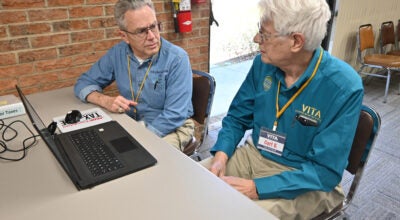School board reflects on meeting with UNC dean of education
Published 12:05 am Sunday, January 22, 2017
By Rebecca Rider
rebecca.rider@salisburypost.com
CHAPEL HILL — The Rowan-Salisbury Board of Education began its retreat with a look towards the future. On Thursday, all seven members of the board met with the University of North Carolina’s new Dean of Education, Fouad And-El-Khalick.
Superintendent Dr. Lynn Moody and the board Saturday morning shared their impressions of the meeting with representatives from the Alvin Independent School District of Alvin, Texas. Moody shared that in the past year, 15 new deans of education have been appointed in North Carolina universities and colleges, and the UNC system received a new president.
“We’re all kind of anxious of how that’s going to play out in the colleges of education,” she said.
And-El-Khalick is a young educator from Lebannon, Moody said, and the board spent an hour with him discussing the future of public education. For Moody, the main takeaway from the conversation was that teachers often feel like factory workers, instead of professionals. She said she hoped she could “bring some honor back to the profession” by making changes in the future to make teachers know that they are valued and respected.
“So I’m taking that home with me as a real challenge,” she said.
One of the chief issues that struck a chord with board members was that of recruiting and retaining teachers. Board Chair Josh Wagner said he found that part of the conversation a little “disheartening.”
“It does not seem like there’s hope that we’re going to turn this corner on teacher recruitment and teacher retention,” he said.
And-El-Khalick told the board that UNC’s college of education has shifted focus from raising up teachers to training lateral entry teachers in order to meet the desperate need of understaffed districts.
Board member Susan Cox agreed with Wagner, and said something that struck her was a discussion about the school systems in other nations. Finland, she said And-El-Khalick told the board, has a fraction of the number of regulations American schools have — and it’s one of the best education systems in the world. Meanwhile, teachers in the U.S. have their hands tied by rules, policy and red tape.
“We can’t teach what our insides are telling us to do,” she said of her fellow teachers.
Cox said that, “we have moved in the wrong direction in this country, and it’s very sad.”
School systems often focus on how to attract and retain teachers, without focusing on the issues that make teachers difficult to attract and retain in the first place, board member Dean Hunter added. Many of those come from a place of state or federal policy.
“I think a lot of times we’re treating the effects of the disease rather than the disease,” Hunter said.
Board member Travis Allen expressed frustration at the disconnect between the direction schools were moving and the reality of colleges and universities. He referenced Rowan-Salisbury School’s move away from row-style desks and older modes of teaching. But when Rowan-Salisbury students arrive at college, they are forced back into that factory model. The university system has not caught up, Allen said, and often equates rigor with the quantity of work assigned, not the quality.
“Rigor should mean substantial, meaningful,” he said.
Moody agreed that some regulations put negative pressure on teachers, and may prevent good teachers from going to work in struggling schools, where they are needed most.
“If you wanted to do that work, why would you choose to,” she wondered. “There’s no incentive.”
Moody also spoke about educators not advocating for the profession. Often, educators may discourage their own students, or others, from entering the profession.
“We are our own worst enemy,” she said.
The board spent much of Saturday discussing how the district can move away from modes of thought that may make teachers feel unvalued, and how it can empower its employees.
Contact reporter Rebecca Rider at 704-797-4264.



